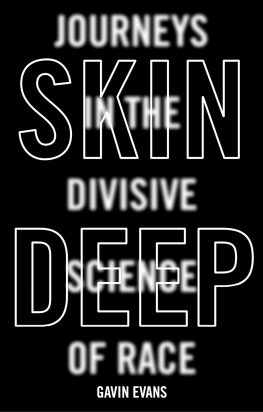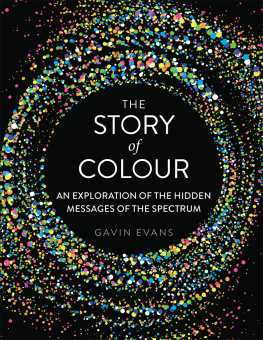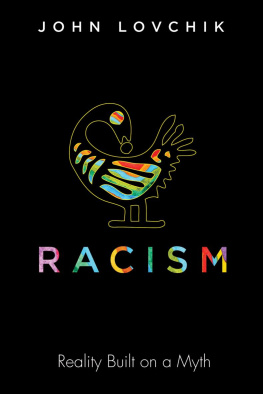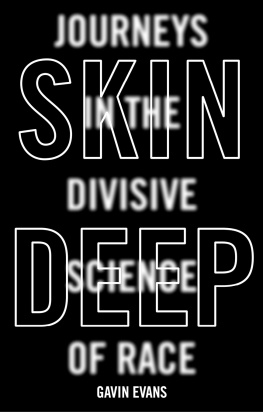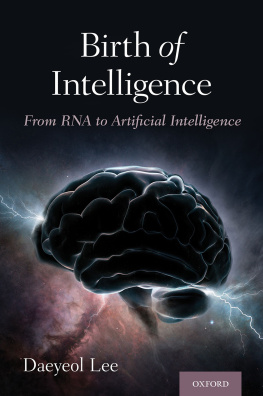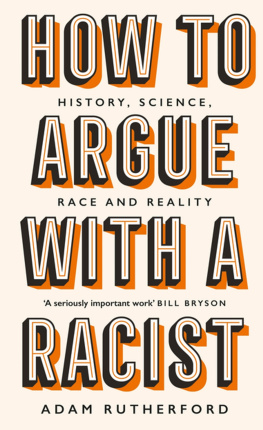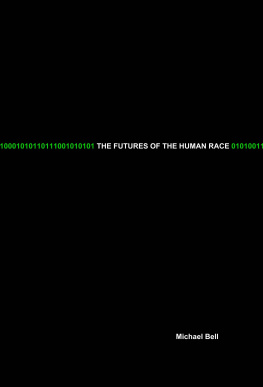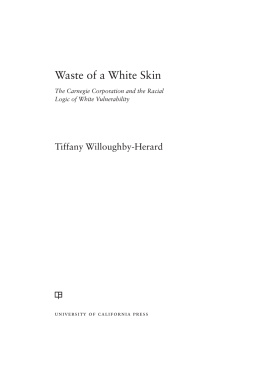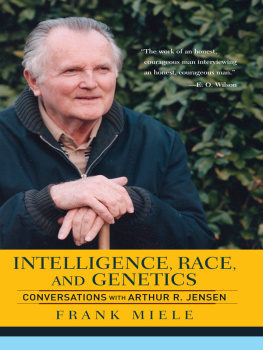Gavin Evans was born in London and grew up in Cape Town, where he became intensely involved in the anti-apartheid struggle. He studied economic history and law before completing a PhD in political studies, writing extensively on race and racism. He lectures in the Culture and Media department at Birkbeck College, London, broadcasts regularly for the BBC World Service and is a keen marathon runner.
To my mum, Joan, and my late dad, Bruce, who set such fine examples in opposing racism.
Foreword
A few tales from my early years growing up in apartheid South Africa:
1981: I was hitchhiking to Zimbabwe and was picked up by a middle-aged, English-speaking couple who proceeded to discuss the mental capacity of African people. The woman explained: The problem with the black mind is that it can only learn things one way and when things dont work that way it gets confused. You can teach him that the wheel goes clockwise when it goes forward but if one day the wheel goes anti-clockwise, he wont understand. Its a known fact and thats why he wont ever invent anything and hell always rely on us.
1975: A group of my white South African classmates was mimicking African accents, prompting a discussion of why they spoke differently. Its because of their brains and their mouths its impossible for them to learn to talk properly, one thirteen-year-old volunteered.
1972: Mr B, the deputy head at my Cape Town state primary school, was teaching us about the hardy heroism of the godly Voortrekkers, who conquered the treacherous Zulus at the Battle of Blood River on their Great Trek north. He drew our attention to the implications of the humanity of his hardy ancestors. The reason we have so much trouble with our natives today, he said, is because unlike the Americans and Australians we didnt wipe ours out. They criticise us but think about it: we wouldnt have so many problems if we had.
1970: Mr O, my teacher, watched H, a Jewish boy, examine his change to see if he had enough for a tuck-shop bun. Counting your Shekels again, hey H, Mr O said knowingly, nodding his head while stroking the tip of his nose. The bell had already rung so he couldnt beat H this time. Usually he managed to find an excuse; at least once a week in woodwork class hed send H off to find a two-by-four plank, which he would then break on the poor boys bum. Every year he seemed to pick a fresh Jewish boy as his favoured victim.
Each of these vignettes suggests a racism resting on a belief that there are profound deficiencies among population groups the unintelligent, linguistically challenged blacks, the treacherous Zulus, the miserly, money-grabbing Jews. This, if you think about it, is what all forms of racism, whether scientific or otherwise, have in common: the notion of innate distinctions between us and them, invariably to our advantage.
I was born in London but grew up mainly in a state that elevated faith in profound difference into a doctrine of racial dominance. As with so many forms of racism, it was spawned by conquest and colonialism, with first Dutch and then British colonists dispossessing the majority of its land, consolidated by segregationist white self-rule from 1910. Nazi-influenced racial science flourished in the 1930s and 1940s, informed by a faith in IQ scores, ethno-psychology and mythology about the native brain. It began to be applied after the apartheid government came to power in 1948, through policies that led to the forced removal of 3.5 million black people from their homes to make more room for white people. Each race group had its own in-built characteristics and was ascribed its own destiny. Whites comprised less than 15 per cent of the population but owned 87 per cent of the land, more than 90 per cent of the wealth, and all the power.
Growing up as a member of the European population meant all this land, and all the privileges accompanying it, was taken for granted. The contact most whites had with black people was with their servants or workers and most seemed comfortable with this system, which helped to mould their views of the world. It was the only life they knew; the appropriate order of things. White children would socialise solely with other white children. The only black people they knew worked for their parents and they found it hard to consider the inferior position of these employees as anything other than natural.
Under apartheid, black Africans were divided into tribal categories, allocated ten little parcels of land to express their national identity, and had only contingent rights to live in white South Africa (contingent on having a pass permitting them to work there). Coloureds (mixed race people) and Asiatics (people with ancestry in the Indian subcontinent) had more rights in white South Africa than Africans but considerably fewer rights than Europeans. These divisions and subdivisions, and the living conditions they created, reinforced perceptions of the other. White South Africans therefore tended to view black South Africans as less intelligent, lacking powers of invention or innovation, oversexed, dishonest and, essentially, child-like; Coloureds as lazy and alcoholic; and Asiatics as sly and scheming. Europeans were not legally subdivided but the backwash of the historical conflict among them lingered; hardly surprising since the Brits were responsible for historys first concentration camps. Twenty thousand Boer children and eight thousand Boer women died in these camps between 1900 and 1902, along with twenty thousand black servants, who are rarely mentioned.
When I was at school and we played rugby against an Afrikaans school, we might absorb insults such as rooinek (red neck), pommie , sout piel (salty penis) and even poes gesig (cunt face), and we were viewed as softer, weaker and less patriotic. We, in turn, imitated their accents in a tone of derision, told jokes about thick Afrikaners, referred to them as Dutchmen, rocks, rockspiders and crunchies and generally viewed them as lacking in brain power and sophistication. Even among English speakers there were subcategories of prejudice; people of Portuguese descent were sometimes called sea kaffirs and, of course, the usual range of anti-Semitic prejudices were never far from the surface. This was the world I grew up in: a place that defined its existence in race categories.

